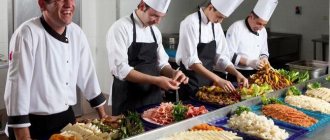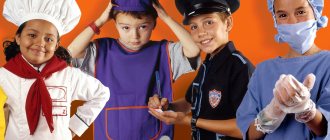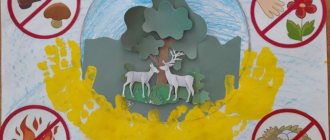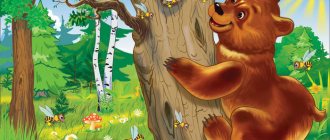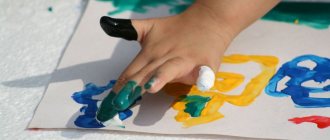MAGAZINE Preschooler.RF
Winner of the All-Russian competition "The most requested article of the month» JANUARY 2018Municipal preschool educational institution "Kindergarten No. 273" Project manager: teacher Tatyana Vladimirovna Starygina Direct educational activities in the second junior group Educational area: "Socialization" Topic: Introducing the profession of "Cook". Project manager: teacher Tatyana Vladimirovna Starygina. Project participants: children of the second junior group. Type of project: group, creative, informational, gaming. Project duration: short-term. Relevance: insufficient awareness of children about the profession of a cook. The project method is one of the new types of activities that is used in the educational process of kindergartens. The design method involves the integration of various activities into a single thematic project, which is based on a problem.
By solving various cognitive and practical problems during the design process together with adults and peers, children are motivated to enrich and activate their vocabulary and communicate adequately with others. Cognitive - research direction is relevant in kindergarten. The goal of the project: to create conditions for the development of children’s creative abilities, to form cognitive activity in the course of work. Objectives of educational areas: 1. Cognition - to expand children’s knowledge about professions; - introduce children to the profession of a cook, - develop curiosity and interest in this profession; - cultivate respect for work. 2. Communication - develop in children the ability to use logically constructed statements in speech; — to develop the ability to use means of communication with peers and adults in order to obtain the necessary information. 3. Reading fiction. - maintain and consolidate interest in fiction as a means of obtaining new information. 4. Artistic creativity - to develop in children the ability to create compositions from paper and plasticine; - support initiative in the manifestation of creativity. The main directions of the project implementation: - joint activities of the teacher with children - conversation, observation of the work of the cook, reading fiction, conversations with children, making works from plasticine, making applications. - joint activities of parents and children - joint work in the home kitchen. — direct educational activities on the topic “Profession of a cook.” Preliminary work: - search work to select material for the project; — selection of fiction; — selection of appropriate illustrations; — preparation of visual aids for making appliqués and for modeling from plasticine. System “web” for the project Profession “Cook” Cognition: - introduce children to the profession of a cook, his work processes, and his assistant objects; Speech development: - poems and riddles, a story about a cook based on a picture. Modeling: - baking gingerbread for mom; Application: - decorate a plate for a festive dinner. Didactic games: - “What’s extra”, “Cooking soup”, “Cooking compote”, “Setting the table for dinner” Estimated results of the project. 1. Children’s knowledge of the profession of a cook. 2. Children’s understanding of the importance of this profession. 3. The ability to organize plot-based role-playing games based on existing knowledge. 4. Showing appreciation and respect for the work of adults. Project development: No. Forms of work Contents 1 Create a developmental environment: replenish the “kitchen” corner. Add attributes: aprons, dishes, vegetables, fruits. introduce didactic and board games: “Professions”; “Who has what?”; “Assemble a picture from cubes”; "Who's doing what"; "Wonderful bag." replenish the library with books by B. Zakhoder “All works are good”; V. Mayakovsky “Who to be?”; K. Chukovsky “Fedorino’s grief.” design the album “Poems about the Cook.” 2 Organize direct educational activities: Social and personal development, familiarization with the profession of a cook. Speech development - looking at a picture of a cook. Productive activity (application), “Decorate the plate”; (modeling) “Bowl with apples.” 3 Joint activities of the teacher with children: an excursion to the kitchen, a conversation about the cook, looking at paintings, illustrations, reading fiction, didactic and board games, role-playing games: “Cooking borscht”, “Invitation to visit”, “Preparing compote for a doll” ", finger games "Salad", "Cabbage", learning poems about the cook, talking about vegetables, guessing riddles about dishes, vegetables and fruits. children's story “How my mother cooks.” 4 Independent activity of children: looking at paintings, illustrations, coloring coloring books “Vegetables and Fruits”, “Dishes”, “All works are good”. board and didactic games “Professions”, “Vegetables and fruits”, “Who has what”, “Assemble a picture from cubes”, “Who is doing what?”, “Wonderful bag”. plot-role-playing games: “preparing borscht”, “invitation to visit”, “preparing compote for the doll” 5 Interaction with the family: joint production of attributes for the plot-role-playing game “Cook”, replenish the “kitchen” corner with dishes, vegetables, fruits; sewing aprons; a selection of poems about the profession of a cook. Project presentation. 1. Exhibition “The most beautiful plate”, “Bowl with apples”. 2. Presentation of the album “Poems about the Cook”. 3. Plot-role-playing game “Preparing a holiday for the doll.” Progress of the excursion to the kitchen. 1. Surprise moment. Conversation The teacher brings a covered basket into the group. Educator: What do you think is in the basket? Children: toys…. Educator: let's see what's in the basket. (vegetables in the basket) Educator: name what vegetables I brought you. Children: carrots, cabbage, potatoes…. Educator: what can you cook from vegetables? Children: soup, borscht, salad…. Educator: where do they cook? Children: in the kitchen. Teacher: who cooks for you at home? Children: mom, grandma, dad. Educator: Guys, who do you think cooks for you in kindergarten? Children: aunt, mother... 2. Excursion to the kitchen Educator: there is such a very important and necessary profession - a cook. I invite you on a tour of our kitchen. There we will meet chef Elena. The children and the teacher go to the kitchen, where the cook meets them. Educator: Look how big and bright the kitchen is. Cook: Guys, what do you use to prepare soup at home? Children: in a saucepan. Cook: in which pans, small or large? Children: big and small. Cook: I'll show you which pan I will cook the soup in (shows the pots). Educator: Children, why are the pots so big? Children: they cook a lot. Educator: Elena, tell us what items help you in your work? The cook shows the items and tells what they are needed for. Educator: Guys, why does a chef need a knife? Children: to cut vegetables, bread, peel potatoes, etc. Educator: what is the ladle for? Children: soup is poured for them. Educator: what is the frying pan for? Children: fry. Educator: Why are pots needed? Children: what to cook in them. Educator: what is a meat grinder for? Children: chop vegetables, meat. Educator: Elena, tell me what you prepared for lunch today? (cook's story). Educator: thank you for the story, but it’s time for us to go to the group. Guys, let's prepare dinner for our dolls. The group organizes a role-playing game “Lunch for dolls”
Appendix 1 Materials for the project Poems about the profession “Cook” B. Zakhoder. Cooks. How easy it is to make lunch! There is nothing difficult about this, it’s as simple as shelling pears: This is it – and you’re done! (If mom cooks dinner.) But it happens that mom has no time, And we cook dinner for ourselves, And then (I don’t understand what the secret is!) It’s very difficult to cook dinner! ****** Cook, cook, cook! Young, remote! The cook banged with a rolling pin, the cook rattled the bowl, took apart spoons and forks and filled pots. The cook did not sleep all night - he served the dinner party, he called all the guests, and treated him to a delicious dish. The guests ate, drank, praised the cook, emptied the boilers, drove off home, and left the cook only to sort out the dishes - Lie down, poor cook, without eating in bed! ***** Cups, spoons, ladles, Matryoshka dolls took a dip, Gurgle! ***** Give the cook food: poultry, dried fruits, rice, potatoes... And then delicious food awaits you. ***** Cook Vasya very deftly peels carrots with a knife. Grate the cheese on a coarse grater. Back and forth and back and forth. He stirs the soup with a ladle And crushes the potatoes with a masher, Cuts the dill with a knife, Whip - whack - whack and into the bowl! It turned out delicious so that he personally takes samples from the dishes. Everything will be salted, peppered and bitter with mustard. ***** And today in our group there will be a new game! All the girls are cooks, and the boys are cooks. We'll put on robes, Caps on our heads, And pots with scoops, Lay out on the tables Our cubes - potatoes And carrots - pencil. Even a ball will become an onion. Our soup will be delicious. Let’s add salt, stir, and pour it into plates. We'll have fun sitting the dolls down and feeding them before bed. We are cooks today, We are cooks today. But let's wash the plates, After all, the game is over.
Appendix 2
Didactic games. "What's extra" cards. Goals and objectives: To develop children’s ability to distinguish between the same and different in objects. Develop attentiveness and ability to generalize. Develop coherent speech. There are playing fields depicting the food needed to prepare various dishes. There is one extra item on each card. Game: Invite the children to look carefully at the cards and determine what is superfluous on these cards, explain why. Verbal game “Cooking compote” Goals and objectives: Developing attention, intensifying the use of adjectives, expanding the vocabulary. The presenter says: Today we will cook compote, I will name the berries and fruits, and you will tell me what kind of compote you will get from them.
For example: Strawberry - strawberry, raspberry - raspberry, blackberry - blackberry, apple - apple, pear - pear. Note: you can also play other word games: Cook soup, make salad, bake a pie, etc.
Verbal game “Waiting for guests” Goals and objectives: Development of attention, consolidation of the names of dishes, expansion of vocabulary. The presenter says: Today guests will come to us. Let's set the festive table. I will tell you a treat or food items, and you will tell me where to put it. For example: Sugar - in a sugar bowl, candy - in a candy bowl, butter - in a butter dish, bread - in a bread box, fruit - in a vase, etc.
Role-playing game “Dining Room (Cafe)” Objectives: To develop children’s interest and respect for the profession of a cook. Cultivate an attentive attitude towards visitors and a culture of communication. Roles: cook, pastry chef, dishwasher, waiter, dining room visitors. Game actions: The cook “prepares the dishes” (places game items on plates), “pours” drinks into cups, and hands them to the waiters. Visitors come to the dining room, carefully examine the menu, ask the cook (or waiter) what is included in the dishes and place an order. Waiters set tables and offer menus. Visitors eat, express their opinions about the dishes, and communicate politely. They ask the waiter to bring the bill and pay for it. The waiter wipes the tables after customers leave. The dishwasher washes the dishes, wipes them with a napkin and puts them back in place.
| Next > |
